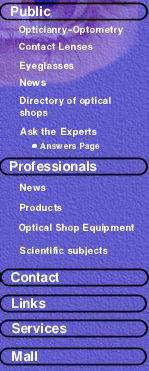|
Macular Degeneration (blurred central
vision)
Introduction
Macular degeneration is the leading cause of
blindness, accounting for one-third of all cases of vision loss.
Most people with the condition have a mild form. The most common
form of macular degeneration occurs in people over age 55 years
and is known as age-related macular degeneration.
What is Macular Degeneration?
At the back of the eye there is a thin layer
of light-sensitive nerve cells and fibres called the retina. We
see things because light entering the eye strikes the retina and
is turned into an electric impulse that the brain understands as
an image.
Near the centre of the retina is a small spot about the size of
a pea called the macula. The macula processes the details in the
central part of the image that the brain receives. The macula needs
good light to work efficiently and works best in daylight.
The rest of the retina is responsible for side, or peripheral, vision.
It is especially sensitive to dim light, which makes night vision
possible.
If the macula deteriorates for some reason, the retina becomes like
a camera with a spot on the film. The centre of the field of vision
blurs, and all detail is lost. This condition is called macular
degeneration.
There are two types of macular degeneration. In the dry type there
is gradual degeneration of the tissue cells that make up the macula,
and symptoms tend to develop over many months or years. In the more
severe wet type, leakage and often hemorrhage occur under the macula,
causing the symptoms to develop over a relatively short period.
Causes
and Symptoms
Although the specific cause of the deterioration is not understood,
age-related macular degeneration seems to be part of the normal
aging process. As the eye gets older, the membrane separating the
macula from the retinal blood vessels that supply it may break down.
At the same time, new, abnormal blood vessels form that may bleed
and displace the macula. Cut off from its source of nourishment,
the macula is permanently damaged. Although macular degeneration
is usually associated with aging, it may be linked to other conditions,
such as infections, high blood pressure, arteriosclerosis and general
diseases like diabetes mellitus.
Children and adolescents may be affected by hereditary macular degeneration.
Myopia, or near-sightedness, is a contributing factor, and excessive
light and eye injuries leading to retinal detachment may also damage
the macula.
The course of the condition may be slow or rapid, but the deterioration
generally occurs over a period of a few years. Peripheral vision
will remain normal, but the person will have difficulty seeing at
a distance or doing detailed work. Faces may begin to blur, and
it becomes harder to distinguish colours. Distortion or wavy lines
may accompany or precede the blurred vision.
Treatment
Treatment begins with an eye examination to try to determine the
cause of the condition. Unfortunately, because so little is known
about the direct cause of macular degeneration, effective treatment
is not possible in all cases.
Lasers are sometimes used to seal damaged blood vessels in the early
stages of the wet type of macular degeneration. To determine whether
laser treatment can help, a test called fluorescein angiography
may be necessary.
This test, which involves injecting a dye into a vein and then photographing
the circulation of the dye, is ordered by an ophthalmologist--a
medically trained eye doctor--and is usually performed in a hospital.
Although macular degeneration cannot be reversed, people with the
condition can usually continue their daily activities using their
peripheral vision and making the best use of their remaining detail
vision.
Devices such as high-intensity reading lamps and magnifiers help
compensate for the loss of detail and make some fine work possible
again.
People with macular degeneration almost never go completely blind.
If you experience blurred or distorted central vision, you should
visit your doctor immediately. Everyone over the age of 45 years
should have regular eye examinations by an ophthalmologist.
| Optics - Optometry | Visual
Acquity | Myopia | Hypermetropia
| Astigmatism |
| Presbyopia | Cataract
| Glaucoma| Keratokonus
| Macular Degeneration |
|









